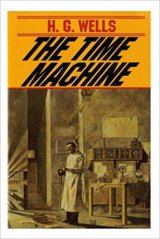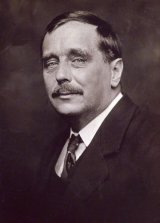The Time Machine Page #12
The Time Machine is a science fiction novella by H. G. Wells, published in 1895 and written as a frame narrative. The work is generally credited with the popularization of the concept of time travel by using a vehicle or device to travel purposely and selectively forward or backward through time.
“In the matter of sepulture, for instance, I could see no signs of crematoria nor anything suggestive of tombs. But it occurred to me that, possibly, there might be cemeteries (or crematoria) somewhere beyond the range of my explorings. This, again, was a question I deliberately put to myself, and my curiosity was at first entirely defeated upon the point. The thing puzzled me, and I was led to make a further remark, which puzzled me still more: that aged and infirm among this people there were none. “I must confess that my satisfaction with my first theories of an automatic civilisation and a decadent humanity did not long endure. Yet I could think of no other. Let me put my difficulties. The several big palaces I had explored were mere living places, great dining-halls and sleeping apartments. I could find no machinery, no appliances of any kind. Yet these people were clothed in pleasant fabrics that must at times need renewal, and their sandals, though undecorated, were fairly complex specimens of metalwork. Somehow such things must be made. And the little people displayed no vestige of a creative tendency. There were no shops, no workshops, no sign of importations among them. They spent all their time in playing gently, in bathing in the river, in making love in a half-playful fashion, in eating fruit and sleeping. I could not see how things were kept going. “Then, again, about the Time Machine: something, I knew not what, had taken it into the hollow pedestal of the White Sphinx. Why? For the life of me I could not imagine. Those waterless wells, too, those flickering pillars. I felt I lacked a clue. I felt—how shall I put it? Suppose you found an inscription, with sentences here and there in excellent plain English, and interpolated therewith, others made up of words, of letters even, absolutely unknown to you? Well, on the third day of my visit, that was how the world of Eight Hundred and Two Thousand Seven Hundred and One presented itself to me! “That day, too, I made a friend—of a sort. It happened that, as I was watching some of the little people bathing in a shallow, one of them was seized with cramp and began drifting downstream. The main current ran rather swiftly, but not too strongly for even a moderate swimmer. It will give you an idea, therefore, of the strange deficiency in these creatures, when I tell you that none made the slightest attempt to rescue the weakly crying little thing which was drowning before their eyes. When I realised this, I hurriedly slipped off my clothes, and, wading in at a point lower down, I caught the poor mite and drew her safe to land. A little rubbing of the limbs soon brought her round, and I had the satisfaction of seeing she was all right before I left her. I had got to such a low estimate of her kind that I did not expect any gratitude from her. In that, however, I was wrong. “This happened in the morning. In the afternoon I met my little woman, as I believe it was, as I was returning towards my centre from an exploration, and she received me with cries of delight and presented me with a big garland of flowers—evidently made for me and me alone. The thing took my imagination. Very possibly I had been feeling desolate. At any rate I did my best to display my appreciation of the gift. We were soon seated together in a little stone arbour, engaged in conversation, chiefly of smiles. The creature’s friendliness affected me exactly as a child’s might have done. We passed each other flowers, and she kissed my hands. I did the same to hers. Then I tried talk, and found that her name was Weena, which, though I don’t know what it meant, somehow seemed appropriate enough. That was the beginning of a queer friendship which lasted a week, and ended—as I will tell you! “She was exactly like a child. She wanted to be with me always. She tried to follow me everywhere, and on my next journey out and about it went to my heart to tire her down, and leave her at last, exhausted and calling after me rather plaintively. But the problems of the world had to be mastered. I had not, I said to myself, come into the future to carry on a miniature flirtation. Yet her distress when I left her was very great, her expostulations at the parting were sometimes frantic, and I think, altogether, I had as much trouble as comfort from her devotion. Nevertheless she was, somehow, a very great comfort. I thought it was mere childish affection that made her cling to me. Until it was too late, I did not clearly know what I had inflicted upon her when I left her. Nor until it was too late did I clearly understand what she was to me. For, by merely seeming fond of me, and showing in her weak, futile way that she cared for me, the little doll of a creature presently gave my return to the neighbourhood of the White Sphinx almost the feeling of coming home; and I would watch for her tiny figure of white and gold so soon as I came over the hill. “It was from her, too, that I learnt that fear had not yet left the world. She was fearless enough in the daylight, and she had the oddest confidence in me; for once, in a foolish moment, I made threatening grimaces at her, and she simply laughed at them. But she dreaded the dark, dreaded shadows, dreaded black things. Darkness to her was the one thing dreadful. It was a singularly passionate emotion, and it set me thinking and observing. I discovered then, among other things, that these little people gathered into the great houses after dark, and slept in droves. To enter upon them without a light was to put them into a tumult of apprehension. I never found one out of doors, or one sleeping alone within doors, after dark. Yet I was still such a blockhead that I missed the lesson of that fear, and in spite of Weena’s distress, I insisted upon sleeping away from these slumbering multitudes. “It troubled her greatly, but in the end her odd affection for me triumphed, and for five of the nights of our acquaintance, including the last night of all, she slept with her head pillowed on my arm. But my story slips away from me as I speak of her. It must have been the night before her rescue that I was awakened about dawn. I had been restless, dreaming most disagreeably that I was drowned, and that sea anemones were feeling over my face with their soft palps. I woke with a start, and with an odd fancy that some greyish animal had just rushed out of the chamber. I tried to get to sleep again, but I felt restless and uncomfortable. It was that dim grey hour when things are just creeping out of darkness, when everything is colourless and clear cut, and yet unreal. I got up, and went down into the great hall, and so out upon the flagstones in front of the palace. I thought I would make a virtue of necessity, and see the sunrise.
Translation
Translate and read this book in other languages:
Select another language:
- - Select -
- 简体中文 (Chinese - Simplified)
- 繁體中文 (Chinese - Traditional)
- Español (Spanish)
- Esperanto (Esperanto)
- 日本語 (Japanese)
- Português (Portuguese)
- Deutsch (German)
- العربية (Arabic)
- Français (French)
- Русский (Russian)
- ಕನ್ನಡ (Kannada)
- 한국어 (Korean)
- עברית (Hebrew)
- Gaeilge (Irish)
- Українська (Ukrainian)
- اردو (Urdu)
- Magyar (Hungarian)
- मानक हिन्दी (Hindi)
- Indonesia (Indonesian)
- Italiano (Italian)
- தமிழ் (Tamil)
- Türkçe (Turkish)
- తెలుగు (Telugu)
- ภาษาไทย (Thai)
- Tiếng Việt (Vietnamese)
- Čeština (Czech)
- Polski (Polish)
- Bahasa Indonesia (Indonesian)
- Românește (Romanian)
- Nederlands (Dutch)
- Ελληνικά (Greek)
- Latinum (Latin)
- Svenska (Swedish)
- Dansk (Danish)
- Suomi (Finnish)
- فارسی (Persian)
- ייִדיש (Yiddish)
- հայերեն (Armenian)
- Norsk (Norwegian)
- English (English)
Citation
Use the citation below to add this book to your bibliography:
Style:MLAChicagoAPA
"The Time Machine Books." Literature.com. STANDS4 LLC, 2025. Web. 22 Jan. 2025. <https://www.literature.com/book/the_time_machine_159>.




Discuss this The Time Machine book with the community:
Report Comment
We're doing our best to make sure our content is useful, accurate and safe.
If by any chance you spot an inappropriate comment while navigating through our website please use this form to let us know, and we'll take care of it shortly.
Attachment
You need to be logged in to favorite.
Log In